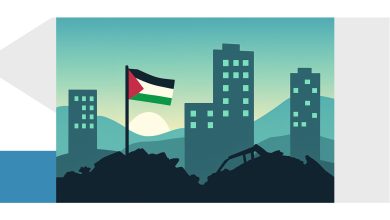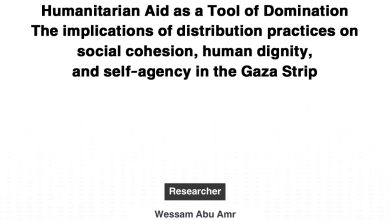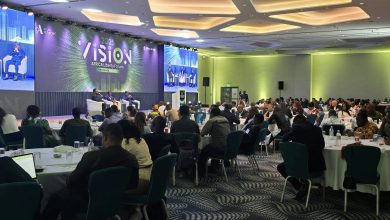Imagine what the Gaza will be doing first once the ceasefire becomes a reality

By: Omar Shaban
Introduction:
In the heart of Gaza, where the echoes of booming sounds intertwine with the moans of rubble, a ceasefire awaited by all Gazans arrives as a brief respite between continuous waves of violence. The awaiting ceasefire has a unique impact on the people of Gaza; it is not just a halt in warfare, but a crucial period that allows the population to breathe without fear, reassess their situation, and gather what remains of lives scattered across the pavements of pain and loss. These temporary moments become more than just a retreat from battle noises; they open the door to complex reflections and questions about life and the future amid the devastation wrought by war.
Every time whispers of a possible truce surface, a complex wave of emotions sweeps through the crowd. Despite the weariness etched deep in their faces, they gather in their various displacement areas to celebrate, tentatively, quietly, without any formal declaration of peace. This cautious jubilation, unmarked by formal truce agreements, is a poignant testament to their yearning for peace. This is the tenth time such news has spread, and with each rumor, the skepticism grows thicker. Yet, despite this growing distrust, on the eve of what could be the first day of a truce, the people of Gaza find themselves clinging to hope, however fragile.
The importance of the ceasefire for the people of Gaza extends beyond immediate relief from bombardment, reaching into the possibility of restoring some semblance of daily life disrupted by the war. In this brief respite, residents strive to rearrange their priorities, from searching for the missing and burying the dead, to repairing the damage inflicted by the machinery of war on their homes and infrastructure. Each individual in Gaza has a different story about how they utilize this period; for some, it’s a chance to search for safety, water, and food, while for others, it’s an opportunity to rebuild familial and social ties that were torn apart under the barrage of bombings.
The psychological and social impact of war on the residents of Gaza is deep and ingrained. Fear, anxiety, and sorrow are prevalent emotions that dominate the atmosphere within families and communities. The ceasefire offers a fragile opportunity for psychological recovery but also exposes the deep scars left by the conflict. Children and youth, who should be spending their days learning and playing, find themselves surrounded by harsh lessons on loss and survival. Adults, trying to provide security for their families, struggle to maintain a semblance of tranquility in a reality filled with upheaval.
This article is based on posts published on Facebook that pose poignant questions about the reasons why the people of Gaza await the ceasefire, not out of joy, but for reasons of greater hardship and pain. The comments interacting with the post reflect the difficult reality that people there live, and show the extent of the war’s impact on their daily and psychological lives. Through reviewing these comments, we discover different dimensions of the psychological and social impact of the conflict, which helps clarify the suffering of individuals and their strategies for coping with crises.
Analysis of Posts and Comments: Through posts and comments on Facebook, diverse emotions and opinions that reflect what the people of Gaza will experience if a ceasefire or agreement were formed become apparent. These posts and comments form a window through which we can view the complex reality of life under conflict. Individuals who have shared their opinions represent various segments of society, each expressing a different aspect of the ceasefire experiences that form part of the general fabric of suffering and hope in Gaza.
- Fear of the Future: One of the youths expresses his future fears filled with anxiety, “All we want is to live in peace, but the fear of upcoming wars or the end of the ceasefire haunts us even in our dreams.” This fear is not just an individual feeling but a collective reality shared by many in Gaza, where constant anxiety fuels a state of uncertainty that casts its shadow over all aspects of life. The ceasefire, although it provides a period of temporary calm, remains clouded with the anxiety of potential renewed violence, making planning for the future fraught with risks and challenges.
- The Need to Express crying: A woman shares her personal experience with the pain she harbors within, describing her desperate need to express this pain, “I want to scream until I empty all the sadness and pain inside me.” These words convey the immense psychological pressure and deep need to relieve the heavy emotional burden that weighs on many. The scream expresses a desire to regain control of oneself and to restore the vitality that is robbed in ongoing conflicts.
- Desire to Migrate: A young man explains his urgent desire to seek a new beginning, saying, “I dream of leaving this place to find a place where I can live without fear.” These words reflect the deep despair and desire to escape from a seemingly endless reality of pain and suffering. Migration here signifies not just a change of location but a quest to redefine life itself away from the shadows of fear and destruction.
- Searching for the Remains of Loved Ones: One person describes the pain during the ceasefire that allows them to search for the bodies of loved ones under the rubble, “We need these moments to be able to bury our dead with dignity.” This text reflects the deep pain and personal tragedy of those who not only suffer from the loss of loved ones but are also unable to provide them with a proper farewell even in death.
- Desire for Basic Amenities: Further elaborating on the yearning for normalcy, another resident of Gaza reflects on the harsh realities of living without electricity, “I wish to see the light at night again; we lived in darkness throughout the entire war.” This longing for light symbolizes a deeper desire for hope and the end of a period marked by darkness and despair. It underscores the importance of basic amenities that sustain not only physical life but also the spirit of a community beleaguered by conflict.
- Desire to Return to Homes: A woman expresses her profound longing to return to her once familiar but now shattered home, imbued with memories, “All I wish for is to return to my home to retrieve what remains of my memories from under the rubble.” This sentiment is echoed by others who share a similar yearning, including one who adds, “I haven’t taken a normal shower since the day we were displaced. I just want that simple comfort again.” These statements powerfully illustrate the basic human desires disrupted by war, spotlighting the deep-seated need for normalcy and the simple pleasures of daily life that many take for granted.
- Hope for Peace: An elderly man reflects a strong and deep desire to see his community live in peace, stating, “All I want is to see Gaza live in peace, away from the sounds of shells and fear.” These words summarize the profound longing for moments of quiet and tranquility, which every individual in the region yearns for.
By reviewing and analyzing these comments, we discover the profound and complex impact of wars on Gaza’s society. A deep understanding of these effects can help guide international and local efforts towards more effective support targeting the psychological, social, and economic needs of the population. However, all this hinges on a ceasefire, not a complete agreement to end the war or a full cessation of hostilities.
Thus, from all these comments, it is possible to analyze in a simplified manner the long-term effects of wars on Gaza’s society, including psychological pressures and social and economic challenges.
Psychological Effects: The psychological pressures borne by the residents of Gaza are immense and multifaceted. The fear of an unknown future dominates many, as evidenced by the comments of individuals who express their ongoing anxiety even during times of ceasefire. This fear arises not only from repeated bombings but also from uncertainty about personal safety and the overall future of the region. The psychological impact of this fear and anxiety extends to affect overall mental health, increasing cases of depression, anxiety, and psychological stress.
Social Challenges: The social challenges faced by the people of Gaza are particularly evident in the comments of individuals who wish to scream and express their pain. The need to express oneself and seek social support during crises becomes more pressing. The feeling of division and isolation affects the social fabric, limiting the community’s ability to recover and rebuild itself after each attack.
Economic Challenges: The economic effects of wars in Gaza are detailed in the comments of individuals who dream of returning to their homes or who express their desire to migrate in search of a better life. The damage to infrastructure impedes reconstruction and limits economic opportunities, leading to increased unemployment and poverty. These factors lead to a deterioration of the economic situation and reinforce feelings of instability and despair.
Dealing with Loss and Grief: Comments from people searching for the remains of their loved ones reflect the deep pain experienced by individuals when dealing with loss. The need to conduct burial ceremonies is part of the grieving process and helps close a painful chapter in their lives. This process is necessary for psychological recovery but also serves as a constant reminder of the human cost of conflict.
Desire for Peace and Stability: Finally, the desire for peace and stability is strongly evident in the comments of those who talk about their hopes for a better future. Peace is not just the absence of war but the building of a community where people can live safely and achieve their aspirations. This hope for peace is a strong motivator to overcome daily challenges and work towards a better future.
In conclusion, the comments interacting with Facebook posts and comments highlight the urgent need to address the effects of wars with a comprehensive approach that includes psychological, social, and economic aspects. They also underline the pressing need for ongoing and effective international support that goes beyond emergency humanitarian aid and targets the roots of the problems, working to establish sustainable infrastructure and provide psychological and social support, not just to rebuild what has been destroyed but to ensure a better future for the people of Gaza.




